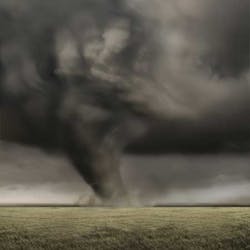one dental professional's perspective
By lauren burns, associate editor
The day after tornadoes ripped through several Oklahoma towns, the editors of Proofs made an effort to contact dental offices in the Moore area. Due to the devastation in the area, phone lines were down. For numbers that were still connected, we reached answering machines. If dental offices weren't closed by necessity, they were closed out of respect. It was all hands on deck the day after the tornado that swept through the city, obliterating neighborhoods and schools and leaving nothing but rubble behind.
It's a difficult thing to call strangers to get a comment for an article. It was difficult to do when Sandy left its footprint in the Northeast, and it's difficult to do now, with Moore a quick trip on the turnpike away. Our state, or our region, is often referred to as Tornado Alley. Yet, with the May 3, 1999 tornado still in the forefront of our minds 14 years later, there is no preparation. There is no getting used to it. There is no accepting that this kind of thing "just happens." Sure, it's tornado alley – but it's also home to many Oklahomans.
You don't know who is going to pick up the phone when it rings. You don't know if they are preparing for a funeral of a loved one. You don't know what they've been through, and you hope that they have nothing to say about it, other than that they're volunteering their time and providing donations to help their community. You hope the storm didn't touch them.
But when I was finally connected, I heard a woman's voice answer the phone. She probably expected to make an appointment when she picked up, not to hear that I was an editor out of Tulsa who wanted to talk about what happened in Moore on Monday.
The first question I asked Gena, a front office administrator, was if the Oklahoma Dental Association or the American Dental Association had contacted their office. "No. We weren't hit by the storm," she told me.
The practice might have been safe, but perhaps their families weren't. I knew this, but I gained a bit of confidence regardless in my next question.
"Did your office close in anticipation of the storm?" "Yes," she answered, emphatically. "What else can you tell me about that day?" There was a slight pause before she answered. "It was a very scary day." I sat there with the phone tucked between my head and shoulder, fingers ready to type what she would tell me. Waiting to hear about what the protocol is at the office for a situation like this. Did they have a shelter? Did they go home? What were they told? What did they expect? However, Gena couldn't muster up any words for me, a stranger, except for "Um." I heard her stifling her cry on the other line, and I felt like the storm had entered her life again. Unexpectedly, the person on the other end of the line was asking her to open up about an event that was still emotionally raw. The funerals of those who perished hadn't yet started.
"It was a horrible day," she continued.
We moved on. I encouraged her to talk about the recovery efforts instead.
"One of our doctors has went out and helped. We are providing gloves and masks to areas of clean ups. There are so many people [trying to help]. [They've had to] turn people away because it's an enormous… I mean, everyone's come together like you wouldn't believe. It's amazing," she explained. Talking about the recovery was much easier. I heard a smile creep onto her face as she concluded, "Makes you proud to be an Oklahoman."
I asked if she had experienced the last major tornado that swept through the area. Qualified as an E-F5, it's a memory that still looms in the minds of Oklahomans around the state. In fact, I still remember sitting in front of the television one night as a child, watching the storm chasers and meteorologists commanding people to take cover. I asked Gena how the 1999 tornado compared to Monday's, which is classified as an E-F4. "This storm is so much worse. It's more devastating. It's just… there's no comparison."
Gena wanted to encourage our readers to give to St. Andrew's United Methodist Church in Oklahoma City. Their website links to UMCOR (United Methodist Committee on Relief), which is accepting donations for the tornado relief efforts.
Before we ended the conversation, Gena revisited the first question. While saying goodbye, she interrupted – "Um," she started, preparing her statement. "I live in Norman and I couldn't get home. It was really bad." She started to cry, but I knew she wanted to tell me about the day. I waited. "It was a bad day. Everything was closed around here. There was no way to get home." The interstate between Moore and Norman was closed. Many people waited hours to get through a journey that would typically take a couple of minutes. Some gave up and walked. "It took me four hours." I asked if she could contact her family. "No. My phone was almost dead, and there was no signal."
Gena's experience is not unlike what many other Moore employees and residents experienced. That unity remains with them in the aftermath of the storm as well. What made Gena smile through this tragedy, after all, was the work to be done that united the community. Her words repeated through my head as I wrote her story – "Makes you proud to be an Oklahoman."
what can make you smile after losing everything?
I heard a smile creep onto her face as she concluded, "Makes you proud to be an Oklahoman."







